Items filtered by date: July 2018
What Causes Plantar Hyperhidrosis?
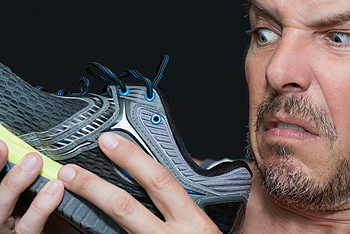 If you are experiencing excessive sweating of the feet, you may have an uncomfortable condition that is referred to as plantar hyperhidrosis. Research has shown that a cause for this ailment to occur may be a nervous system that is overactive. Other foot conditions may develop as a result of plantar hyperhidrosis, and these may include the formation of painful blisters and athlete’s foot, in addition to a foul odor coming from the feet. It may be hazardous to perform any type of martial arts, exercise, or dance routine, which may possibly cause wet spots to form on the mats, that are typically used. It may cause falling to occur easily, which may lead to serious injuries. Please schedule a consultation with a podiatrist if you are afflicted with plantar hyperhidrosis of the feet and would like additional information.
If you are experiencing excessive sweating of the feet, you may have an uncomfortable condition that is referred to as plantar hyperhidrosis. Research has shown that a cause for this ailment to occur may be a nervous system that is overactive. Other foot conditions may develop as a result of plantar hyperhidrosis, and these may include the formation of painful blisters and athlete’s foot, in addition to a foul odor coming from the feet. It may be hazardous to perform any type of martial arts, exercise, or dance routine, which may possibly cause wet spots to form on the mats, that are typically used. It may cause falling to occur easily, which may lead to serious injuries. Please schedule a consultation with a podiatrist if you are afflicted with plantar hyperhidrosis of the feet and would like additional information.
If you are suffering from hyperhidrosis contact Dr. Mark Gagnon of Advanced Podiatry. Our doctor can provide the care you need to attend to all of your foot and ankle needs.
Hyperhidrosis of the Feet
Hyperhidrosis is a rare disorder that can cause people to have excessive sweating of their feet. This can usually occur all on its own without rigorous activity involved. People who suffer from hyperhidrosis may also experience sweaty palms.
Although it is said that sweating is a healthy process meant to cool down the body temperature and to maintain a proper internal temperature, hyperhidrosis may prove to be a huge hindrance on a person’s everyday life.
Plantar hyperhidrosis is considered to be the main form of hyperhidrosis. Secondary hyperhidrosis can refer to sweating that occurs in areas other than the feet or hands and armpits. Often this may be a sign of it being related to another medical condition such as menopause, hyperthyroidism and even Parkinson’s disease.
In order to alleviate this condition, it is important to see your doctor so that they may prescribe the necessary medications so that you can begin to live a normal life again. If this is left untreated, it is said that it will persist throughout an individual’s life.
A last resort approach would be surgery, but it is best to speak with your doctor to find out what may be the best treatment for you.
If you have any questions please feel free to contact one of our offices located in Crestwood, Orland Park, and Summit, IL . We offer the newest diagnostic and treatment technologies for all your foot and ankle needs.
Foods That May Cause Gout
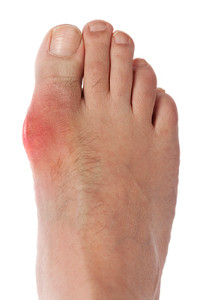 The foot condition that is referred to as gout often develops as a result of increased uric acid levels that are found in the blood. Crystals will form in the joints in the bottom of the big toe, often producing severe pain and discomfort. Foods that contain high amounts of purine are typically responsible for the onset of gout. These group of foods may include certain types of seafood, liver, bacon, or alcoholic beverages. There are several ways to prevent gout from forming, including losing weight slowly if needed, drinking plenty of fresh water daily, and increasing your consumption of fruits and vegetables. The treatment of gout typically involves taking anti-inflammatory medications, in addition to incorporating positive lifestyle changes into your daily routine. Please consult with a podiatrist for additional information about gout.
The foot condition that is referred to as gout often develops as a result of increased uric acid levels that are found in the blood. Crystals will form in the joints in the bottom of the big toe, often producing severe pain and discomfort. Foods that contain high amounts of purine are typically responsible for the onset of gout. These group of foods may include certain types of seafood, liver, bacon, or alcoholic beverages. There are several ways to prevent gout from forming, including losing weight slowly if needed, drinking plenty of fresh water daily, and increasing your consumption of fruits and vegetables. The treatment of gout typically involves taking anti-inflammatory medications, in addition to incorporating positive lifestyle changes into your daily routine. Please consult with a podiatrist for additional information about gout.
Gout is a painful condition that can be treated. If you are seeking treatment, contact Dr. Mark Gagnon from Advanced Podiatry. Our doctor will treat your foot and ankle needs.
What Is Gout?
Gout is a form of arthritis that is characterized by sudden, severe attacks of pain, redness, and tenderness in the joints. The condition usually affects the joint at the base of the big toe. A gout attack can occur at any random time, such as the middle of the night while you are asleep.
Symptoms
- Intense Joint Pain - Usually around the large joint of your big toe, and it most severe within the first four to twelve hours
- Lingering Discomfort - Joint discomfort may last from a few days to a few weeks
- Inflammation and Redness -Affected joints may become swollen, tender, warm and red
- Limited Range of Motion - May experience a decrease in joint mobility
Risk Factors
- Genetics - If family members have gout, you’re more likely to have it
- Medications - Diuretic medications can raise uric acid levels
- Gender/Age - Gout is more common in men until the age of 60. It is believed that estrogen protects women until that point
- Diet - Eating red meat and shellfish increases your risk
- Alcohol - Having more than two alcoholic drinks per day increases your risk
- Obesity - Obese people are at a higher risk for gout
Prior to visiting your podiatrist to receive treatment for gout, there are a few things you should do beforehand. If you have gout you should write down your symptoms--including when they started and how often you experience them, important medical information you may have, and any questions you may have. Writing down these three things will help your podiatrist in assessing your specific situation so that he or she may provide the best route of treatment for you.
If you have any questions, please feel free to contact one of our offices located in Crestwood, Orland Park, and Summit, IL . We offer the newest diagnostic and treatment technologies for all your foot care needs.
What Causes Cracked Heels?
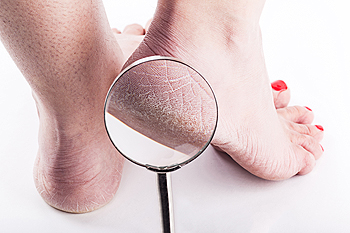 If you stand for extended periods of time you may experience a condition that is referred to as cracked heels. Certain skin conditions that may include psoriasis and eczema may also play a significant role in the development of this condition. The formation of deep cracks, which are also known as fissures, may result in pain and discomfort, and walking may become difficult. The skin on the heels will typically become dry and is usually a result of obesity, wearing shoes that have an open back, and cold winter weather, which may aid in producing dry skin. An effective remedy includes washing and drying the feet thoroughly, followed by utilizing a good moisturizer that will help the skin become soft. It’s advised to consult with a podiatrist if you are afflicted with severely cracked heels, to learn about proper treatment options that are correct for you.
If you stand for extended periods of time you may experience a condition that is referred to as cracked heels. Certain skin conditions that may include psoriasis and eczema may also play a significant role in the development of this condition. The formation of deep cracks, which are also known as fissures, may result in pain and discomfort, and walking may become difficult. The skin on the heels will typically become dry and is usually a result of obesity, wearing shoes that have an open back, and cold winter weather, which may aid in producing dry skin. An effective remedy includes washing and drying the feet thoroughly, followed by utilizing a good moisturizer that will help the skin become soft. It’s advised to consult with a podiatrist if you are afflicted with severely cracked heels, to learn about proper treatment options that are correct for you.
If the skin on your feet starts to crack, you may want to see a podiatrist to find treatment. If you have any concerns, contact Dr. Mark Gagnon from Advanced Podiatry. Our doctor can provide the care you need to keep you pain-free and on your feet.
Cracked Heels
It is important to moisturize your cracked heels in order to prevent pain, bleeding, and infection. The reason cracked heels form is because the skin on the foot is too dry to support the immense pressure placed on them. When the foot expands, the dry skin on the foot begins to split.
Ways to Help Heal Them
- Invest in a good foot cream
- Try Using Petroleum Jelly
- Ease up on Soaps
- Drink Plenty of Water
Ways to Prevent Cracked Heels
- Moisturize After Showering
- Skip a Shower
- Keep Shower Water Lukewarm
- Don’t Scrub Your Feet
If you are unsure how to proceed in treating cracked heels, seek guidance from a podiatrist. Your doctor will help you with any questions or information you may need.
If you have any questions, please feel free to contact one of our offices located in Crestwood, Orland Park, and Summit, IL . We offer the newest diagnostic and treatment technologies for all your foot care needs.
How Can I Find Relief From My Arthritic Feet?
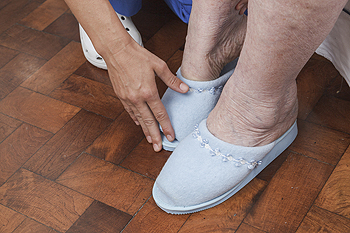 If you are afflicted with arthritic feet, you may find it difficult to perform certain activities, including walking. There is typically a moderate level of inflammation that surrounds the joints of the foot, which may produce considerable pain and discomfort. There are several different forms of arthritis which may affect the feet. If the cartilage begins to decay at the base of the toe, you may have what is referred to as osteoarthritis. This may contribute to other foot conditions such as bunions. Preventive measures may include choosing to wear wider shoes that do not put pressure on the bunion. Additionally, if the joints on the ball of the foot become inflamed, you may have rheumatoid arthritis. This may cause the bone to rub and push against the skin on the sole of the foot, which can often produce severe pain. A possible treatment option that may temporarily provide moderate relief involves attaching a long strip of leather to the bottom of the shoe behind the arch. This may aid in reducing a portion of the pressure that is often associated with this type of arthritis. It’s suggested to consult with a podiatrist to discuss further relief remedies and treatment protocols.
If you are afflicted with arthritic feet, you may find it difficult to perform certain activities, including walking. There is typically a moderate level of inflammation that surrounds the joints of the foot, which may produce considerable pain and discomfort. There are several different forms of arthritis which may affect the feet. If the cartilage begins to decay at the base of the toe, you may have what is referred to as osteoarthritis. This may contribute to other foot conditions such as bunions. Preventive measures may include choosing to wear wider shoes that do not put pressure on the bunion. Additionally, if the joints on the ball of the foot become inflamed, you may have rheumatoid arthritis. This may cause the bone to rub and push against the skin on the sole of the foot, which can often produce severe pain. A possible treatment option that may temporarily provide moderate relief involves attaching a long strip of leather to the bottom of the shoe behind the arch. This may aid in reducing a portion of the pressure that is often associated with this type of arthritis. It’s suggested to consult with a podiatrist to discuss further relief remedies and treatment protocols.
Arthritis can be a difficult condition to live with. If you are seeking treatment, contact Dr. Mark Gagnon from Advanced Podiatry. Our doctor can provide the care you need to keep you pain-free and on your feet.
Arthritic Foot Care
Arthritis is a joint disorder that involves the inflammation of different joints in your body, such as those in your feet. Arthritis is often caused by a degenerative joint disease and causes mild to severe pain in all affected areas. In addition to this, swelling and stiffness in the affected joints can also be a common symptom of arthritis.
In many cases, wearing ill-fitting shoes can worsen the effects and pain of arthritis. Wearing shoes that have a lower heel and extra room can help your feet feel more comfortable. In cases of rheumatoid arthritis, the arch in your foot may become problematic. Buying shoes with proper arch support that contour to your feet can help immensely.
Alleviating Arthritic Pain
- Exercises that stretch the foot can prevent further pain and injury and increase mobility
- Most of the pain can be alleviated with anti-inflammatory drugs, heat, and topical medications
- Massages can help temporarily alleviate pain.
It is best to see your doctor for the treatment that is right for your needs and symptoms. Conditions vary, and a podiatrist can help you determine the right method of care for your feet.
If you have any questions, please feel free to contact one of our offices located in Crestwood, Orland Park, and Summit, IL . We offer the newest diagnostic tools and technology to treat your foot and ankle needs.
How Falls May be Prevented
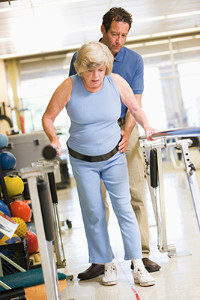 Recent research has shown that when the body becomes stronger through stretching and exercise, the risk of falling may decrease. Performing proper stretching techniques may improve balance and this may greatly diminish the fear of falling. Walking has been known to be beneficial in maintaining proper balance in addition to practicing the Chinese martial arts that is known as tai chi. It’s important to properly take care of your feet by trimming the toenails correctly, and regularly visiting a podiatrist who can properly assess the general health of the feet. Conditions in the home may be improved by using non-slip rugs, installing brighter bulbs, and using a bar in the tub or shower area for increased stability. Medications may need to be reviewed on a routine basis in addition to having a vision test performed that will ensure you are seeing correctly. When these simple strategies are implemented, the fear of falling may disappear.
Recent research has shown that when the body becomes stronger through stretching and exercise, the risk of falling may decrease. Performing proper stretching techniques may improve balance and this may greatly diminish the fear of falling. Walking has been known to be beneficial in maintaining proper balance in addition to practicing the Chinese martial arts that is known as tai chi. It’s important to properly take care of your feet by trimming the toenails correctly, and regularly visiting a podiatrist who can properly assess the general health of the feet. Conditions in the home may be improved by using non-slip rugs, installing brighter bulbs, and using a bar in the tub or shower area for increased stability. Medications may need to be reviewed on a routine basis in addition to having a vision test performed that will ensure you are seeing correctly. When these simple strategies are implemented, the fear of falling may disappear.
Preventing falls among the elderly is very important. If you are older and have fallen or fear that you are prone to falling, consult with Dr. Mark Gagnon from Advanced Podiatry. Our doctor will assess your condition and provide you with quality advice and care.
Every 11 seconds, an elderly American is being treated in an emergency room for a fall related injury. Falls are the leading cause of head and hip injuries for those 65 and older. Due to decreases in strength, balance, senses, and lack of awareness, elderly persons are very susceptible to falling. Thankfully, there are a number of things older persons can do to prevent falls.
How to Prevent Falls
Some effective methods that older persons can do to prevent falls include:
- Enrolling in strength and balance exercise program to increase balance and strength
- Periodically having your sight and hearing checked
- Discuss any medications you have with a doctor to see if it increases the risk of falling
- Clearing the house of falling hazards and installing devices like grab bars and railings
- Utilizing a walker or cane
- Wearing shoes that provide good support and cushioning
- Talking to family members about falling and increasing awareness
Falling can be a traumatic and embarrassing experience for elderly persons; this can make them less willing to leave the house, and less willing to talk to someone about their fears of falling. Doing such things, however, will increase the likelihood of tripping or losing one’s balance. Knowing the causes of falling and how to prevent them is the best way to mitigate the risk of serious injury.
If you have any questions, please feel free to contact one of our offices located in Crestwood, Orland Park, and Summit, IL . We offer the newest diagnostic and treatment technologies for all your foot care needs.
